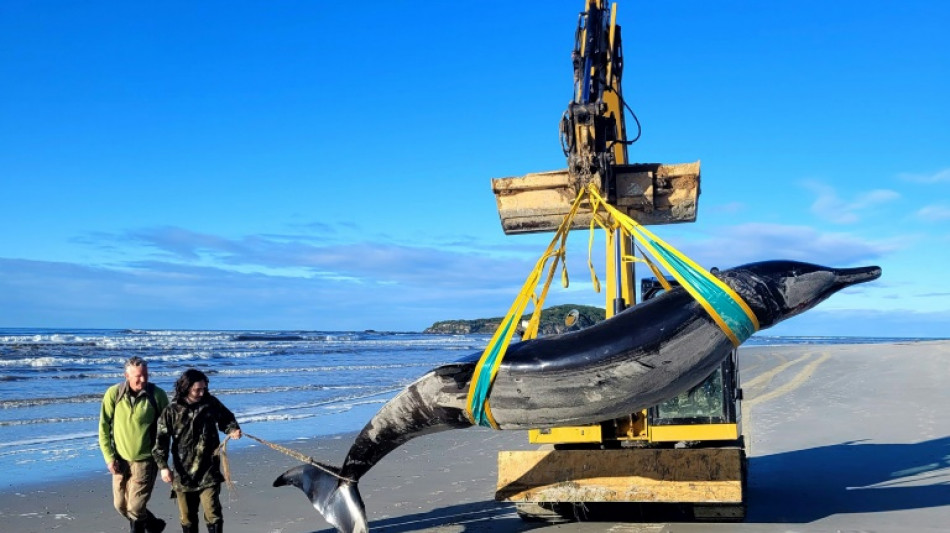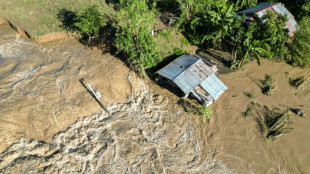
-
 Police break up Georgia vote protest as president mounts court challenge
Police break up Georgia vote protest as president mounts court challenge
-
Spain royals visit flood epicentre after chaotic trip

-
 France's Gisele Pelicot says 'macho' society must change attitude on rape
France's Gisele Pelicot says 'macho' society must change attitude on rape
-
G20 leaders talk climate, wars -- and brace for Trump's return

-
 US lawmaker accuses Azerbaijan in near 'assault' at COP29
US lawmaker accuses Azerbaijan in near 'assault' at COP29
-
Tuchel's England have 'tools' to win World Cup, says Carsley

-
 Federer hails 'historic' Nadal ahead of imminent retirement
Federer hails 'historic' Nadal ahead of imminent retirement
-
Ukraine vows no surrender, Kremlin issues nuke threat on 1,000th day of war

-
 Novo Nordisk's obesity drug Wegovy goes on sale in China
Novo Nordisk's obesity drug Wegovy goes on sale in China
-
Spain royals to visit flood epicentre after chaotic trip: media

-
 French farmers step up protests against EU-Mercosur deal
French farmers step up protests against EU-Mercosur deal
-
Rose says Europe Ryder Cup stars play 'for the badge' not money

-
 Negotiators seek to break COP29 impasse after G20 'marching orders'
Negotiators seek to break COP29 impasse after G20 'marching orders'
-
Burst dike leaves Filipino farmers under water

-
 Markets rally after US bounce as Nvidia comes into focus
Markets rally after US bounce as Nvidia comes into focus
-
Crisis-hit Thyssenkrupp books another hefty annual loss

-
 US envoy in Lebanon for talks on halting Israel-Hezbollah war
US envoy in Lebanon for talks on halting Israel-Hezbollah war
-
India to send 5,000 extra troops to quell Manipur unrest

-
 Sex, drugs and gritty reality on Prague's underworld tours
Sex, drugs and gritty reality on Prague's underworld tours
-
Farmers descend on London to overturn inheritance tax change

-
 Clippers upset Warriors, Lillard saves Bucks
Clippers upset Warriors, Lillard saves Bucks
-
Acquitted 'Hong Kong 47' defendant sees freedom as responsibility

-
 Floods strike thousands of houses in northern Philippines
Floods strike thousands of houses in northern Philippines
-
Illegal farm fires fuel Indian capital's smog misery

-
 SpaceX set for Starship's next flight, Trump expected to attend
SpaceX set for Starship's next flight, Trump expected to attend
-
Texans cruise as Cowboys crisis deepens

-
 Do the Donald! Trump dance takes US sport by storm
Do the Donald! Trump dance takes US sport by storm
-
Home hero Cameron Smith desperate for first win of 2024 at Australian PGA

-
 Team Trump assails Biden decision on missiles for Ukraine
Team Trump assails Biden decision on missiles for Ukraine
-
Hong Kong court jails 45 democracy campaigners on subversion charges

-
 Several children injured in car crash at central China school
Several children injured in car crash at central China school
-
Urban mosquito sparks malaria surge in East Africa

-
 Djibouti experiments with GM mosquito against malaria
Djibouti experiments with GM mosquito against malaria
-
Pulisic at the double as USA cruise past Jamaica

-
 Many children injured after car crashes at central China school: state media
Many children injured after car crashes at central China school: state media
-
Asian markets rally after US bounce as Nvidia comes into focus

-
 Tens of thousands march in New Zealand Maori rights protest
Tens of thousands march in New Zealand Maori rights protest
-
Five takeaways from the G20 summit in Rio

-
 China, Russia ministers discuss Korea tensions at G20: state media
China, Russia ministers discuss Korea tensions at G20: state media
-
Kohli form, opening woes dog India ahead of Australia Test series

-
 Parts of Great Barrier Reef suffer highest coral mortality on record
Parts of Great Barrier Reef suffer highest coral mortality on record
-
Defiant Lebanese harvest olives in the shadow of war

-
 Russian delegations visit Pyongyang as Ukraine war deepens ties
Russian delegations visit Pyongyang as Ukraine war deepens ties
-
S.Africa offers a lesson on how not to shut down a coal plant

-
 Italy beat Swiatek's Poland to reach BJK Cup final
Italy beat Swiatek's Poland to reach BJK Cup final
-
Japan, UK to hold regular economic security talks

-
 Divided G20 fails to agree on climate, Ukraine
Divided G20 fails to agree on climate, Ukraine
-
Can the Trump-Musk 'bromance' last?

-
 US to call for Google to sell Chrome browser: report
US to call for Google to sell Chrome browser: report
-
Macron hails 'good' US decision on Ukraine missiles


World's rarest whale washes up on New Zealand beach
The body of a spade-toothed whale -- a species so rare it has never been seen alive -- appears to have washed up on a New Zealand beach, scientists say.
The remains of the obscure, five-metre (16.4 foot) long, beaked creature were found near a river mouth in southern Otago province on July 4, government researchers said.
It was identified by marine-mammal experts from New Zealand's Department of Conservation and the national museum, Te Papa, as a male spade-toothed whale.
A DNA investigation has been launched to confirm its classification, the scientists said.
"Spade-toothed whales are one of the most poorly known large mammalian species of modern times," said the conservation department's coastal Otago operations manager, Gabe Davies.
"Since the 1800s, only six samples have ever been documented worldwide, and all but one of these was from New Zealand," Davies said in a statement Monday.
"From a scientific and conservation point of view, this is huge."
The find was fresh enough to offer the first opportunity for a spade-toothed whale to be dissected, the conservation department said.
The species is "so rare next to nothing is known about them", it said.
- 'International importance' -
The body of the whale has been placed in cold storage and genetic samples have been sent to the University of Auckland as curators of the New Zealand Cetacean Tissue Archive.
It may take several weeks or months for the DNA to be processed and a final identification confirmed.
"The rarity of the whale means conversations around what to do next will take more time because it is a conversation of international importance," the conservation department said.
The species was first described in 1874 from just a lower jaw and two teeth collected from the Chatham Islands off the east coast of New Zealand.
That sample, along with skeletal remains of two other specimens found in New Zealand and Chile, enabled scientists to confirm a new species.
Marine scientist Vanessa Pirotta said researchers would study the whale's stomach contents, genetics, and how this sample compared to previous ones.
This could shine light on the whales' behaviour, their population and why they are so rare, Pirotta told AFP, describing the discovery as "like hitting the jackpot".
Because so few specimens have been found and there have been no live sightings, little is known about the spade-toothed whale and it is classified as "data deficient" under New Zealand's Threat Classification System.
The first intact specimen was from a mother and calf stranding in Bay of Plenty in 2010, the New Zealand conservation department said.
A further stranding in 2017 in Gisborne added one more specimen to the collection.
O.Gutierrez--AT

